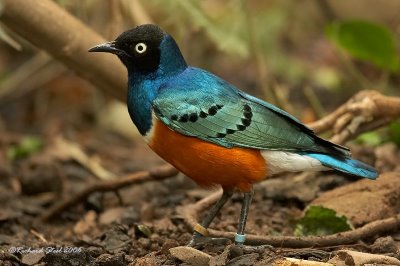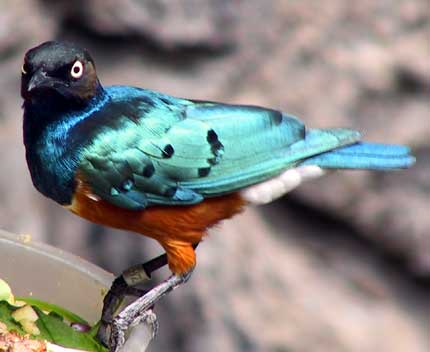 |
BREEDS & their NEEDS
Spreo
Starling
LAMPROTOMIS SUPERBUS |
 |
|
GENERAL INFORMATION
(all underlined
words/phrases in
ORANGE are
relevant, useful links
to other pages in the
website
- just click on them to access)
DESCRIPTION :
ADVANTAGES to KEEPING the Spreo Starling
DISADVANTAGES
AVAILABILITY to PURCHASE
SUITABILITY
-
Those
interesting in starting with soft-billed birds.
-
They
are good for a first-timer
-
As
they are fairly straightforward and hardy to look after.
DIET
-
They
are omnivorous by nature (ie. they will eat a wide variety of
foods.)
-
They
thrive on a diet of coarse-grade softbill food, chopped fruit
and some live-food such as
mealworms and crickets
-
Calcium and a good Vit/min supplement is also required on a
regular basis.
HOUSING
-
They
are best kept on their own.
-
A
spacious Aviary planted with safe vegetation
-
Expect some damage to the vegetation, which will need replacing
as and when necessary.
-
They
must have a weatherproof Shelter/Shed area, for the colder
months
-
If
your birds prefer to roost outside, make sure you provide
some winter protection in the form
of perspex sheeting to the outside of the Aviary mesh.
-
No
bird can tolerated being in a draft - so makes sure the wind
can't "Whistle" thru the Aviary
-
Make
sure your birds always have something wooden or plastic they can
get in or behind to shelter.
-
They
love to bathe,
esp. in the Spring, so provide a suitable plastic dish (a dog's
bowl would be good.)
VOICE
NESTING
-
Provide a medium-sized parakeet-style
NESTBOX in a protected, sheltered position.
-
They
need plenty of assorted Nesting Material as they make a rather
bulky nest in the N.Box.
EGGS:
2 - 4
INCUBATION:
Approx. 13 days
FLEDGING:
Approx. 3 weeks
-
It's
best to clean the nest out between broods, if possible.
-
Once
the First Round of Chicks are independent probably best to
remove to another Aviary.
WORMING
-
They
need regular
WORMING and good hygiene
standards because of their messy droppings due
to their soft-bill diet.
-
Click
on link above for in depth details on Worming and Wormers
-
Uneaten fruit, esp. in warm weather can cause a build-up of
fungal spores and can lead to digestive upsets or
potentially fatal infections.
-
Perches must also be kept clean to prevent foot infections (see
Bumble Foot)
-
Use
an absorbent Floor covering such as
"Easibed".
AVERAGE
LIFESPAN
DID YOU
KNOW?
^Top
 |